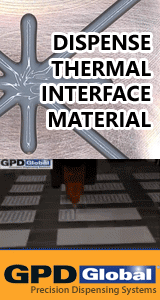Printed Circuit Board Assembly & PCB Design Forum
SMT electronics assembly manufacturing forum.
- SMTnet
- »
- Electronics Forum
- »
- Squeegee angles
Squeegee angles
Views: 4219
![]() So, if 45� is theoretically optimal for aperture fill, but 6...
- Mar 13, 2006
by
Steve Thomas
So, if 45� is theoretically optimal for aperture fill, but 6...
- Mar 13, 2006
by
Steve Thomas
![]()
![]()
![]() 45* is a common angle of attack. Squeegee blades are common...
- Mar 13, 2006
by
davef
45* is a common angle of attack. Squeegee blades are common...
- Mar 13, 2006
by
davef
![]()
![]()
![]() "45* is a common angle of attack. Squeegee blades are common...
- Mar 14, 2006
by
Steve Thomas
"45* is a common angle of attack. Squeegee blades are common...
- Mar 14, 2006
by
Steve Thomas
![]()
![]()
![]() We're not sure what you're reading, but the angle thing make...
- Mar 14, 2006
by
davef
We're not sure what you're reading, but the angle thing make...
- Mar 14, 2006
by
davef
![]()
![]()
![]() "We're not sure what you're reading, but the angle thing mak...
- Mar 14, 2006
by
Steve Thomas
"We're not sure what you're reading, but the angle thing mak...
- Mar 14, 2006
by
Steve Thomas
![]()
![]()
![]() H Steve, I understand what you're asking except the "defingi...
- Mar 15, 2006
by
H Steve, I understand what you're asking except the "defingi...
- Mar 15, 2006
by
![]()
![]() "better gasketing, less dog-earing"
I suppose gasketing c...
- Mar 16, 2006
by
Steve Thomas
"better gasketing, less dog-earing"
I suppose gasketing c...
- Mar 16, 2006
by
Steve Thomas
![]()
- SMTnet
- »
- Electronics Forum
- »
- Squeegee angles







